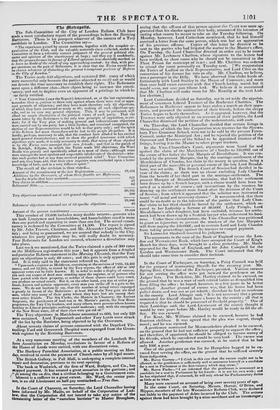In the Court of Chancery, on Saturday, the Lord Chancellor
having been informed by Mr. Maule, on behalf of the Corporation of Lud- low, that the Corporation did not intend to take any notice of the threatening letter of the "nameless barrister" to Master Brougham, seeing that the offence of that person against the CI tat was more ag- gravated than his slander against their body, announced his intention of stating wind course he meant to take on the Tuesday following. On Monday, however, Lord Cottenham mentioned, that he bad himself received a letter from the same person, which was but an aggravation of his previous offence. Copies of this letter he directed to be sent to the parties who had litigated the mutter in the Master's office. On Tuesday, the Lord Chancellor directed an order sisi to be issued against Mr. Lechmere Charlton, whose signature to the letters had been verified, to show cause why he should not he committed to the Fleet Prison for contempt of ccurt ; and Mr. Charlton was ordered to attend the court personally on Tuesday next. [ We congratulate the Tories of Ludlow on their Representative, and Lord Clive on the conversion of his former foe into an ally. Mr. Charlton, we believe, was a passenger in the Dilly. We have observed him shake hands af- fectionately with Lord Stanley in the House of Commons, and more than once hold sweet converse with that Church-loving, moral, but it would seem, not over pun. tilious lord. We believe it is ascertained that Mr. Charlton will make room for Mr. Romilly at the next Lud- low election.] Lord Cottenham decided on Saturday, not to set aside the appoint- ment of seventeen Liberal Trustees of the Rochester Charities, The Reformers in Rochester appear to have stolen a march on their oppo- nents, and procured the nomination of their friends, before the sleepy Tories began to bestir themselves. As it appeared, however, that the Trustees were only objected to on account of their politics, the Lord Chancellor dismissed the petition of the malecontents, with costs.
On Thursday, the Lord Chancellor decided that certain livings in Shropshire, of which the late Corporation were trustees for the Shrews- bury Free Grammar School, were not to be sold by the present Town- Council, under the Municipal Act ; and he rejected the petition of the Governor and Trustees of the School to be appointed trustees of the livings, leaving it to the Master to select proper trustees.
In the Vice- Chancellor's Court, arguments were heard for and against the claim of the Marchioness of Chandos to 130,0001. out of the estate of her father the late illarquis of Breadalbane. It was con- tended by the present Marquis, that by the marriage-settlement of the Marchioness of Chandos, her claim to the money in question, being a third part of the moveable or personal estate of the late Lord Breaded- bane, was set aside. The Scotch Court of Session had decided in fa- vour of the claim ; as there was no clause excluding Lady Chandos from the benefit of her third part in the marriage-settlement. The present Marquis of Breadalbane maintains, that had the settlement been drawn up by a Scotch lawyer, such a clause would have been in- serted as a matter of course ; and instructions by the trustees for drawing up the settlement were found after the decision of the Court of Session ; from which it appeared that the solicitor was instructed to insert "all usual and necessary clauses." It was contended, that there could be no doubt as to the intention of the parties that Lady Chan- dos' claim to her third should be barred by the settlement, which se- cured to her Ladyship a fortune of 30,000/. Lady Pringle, Lord Breadalbane's other daughter, had been excluded, because her settle- ment had been drawn up by a Scottish lawyer who understood his busi. ness. Under these circumstances, the Vice- Chancellor was petitioned to grant an injunction to prevent the trustees of the late Marquis's will from paying the 130,000/, and to restrain Lord and Lady Chandos from taking proceedings against the trustees to compel payment.
Sir Launeelot Shadwell reserved his judgment.
The arguments in the case of the Bank of England versus the Lon- don and Westminster Bank, which have occupied the Court of King's Bench for three days, were brought to a close yesterday. Mr. Maule appeared for the Bank of Englund, and Sir Joint Campbell for the London and Westminster Bank. The Court intimated that they should take some time to consider their decision.


























 Previous page
Previous page